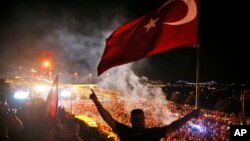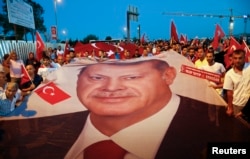The Obama administration is walking a fine line in the wake of the failed coup attempt in Turkey, as it seeks to support a key NATO ally in crisis and caution Ankara against actions that will undermine its democracy.
“People all across the country are quite on edge and quite uneasy,” White House Press Secretary Josh Earnest told reporters on Thursday. “It’s why the United States is going to closely monitor the situation moving forward.”
Since the military’s attempted takeover on July 15, President Tayyip Recep Erdogan’s government has moved swiftly, rounding up nearly 10,000 people. Thousands of police officers, judges and educators have been suspended or ordered to resign.
The government has declared a 90-day state of emergency, giving the government “a good opportunity to fight against coup plotters,” according to Deputy Prime Minister Numan Kurtulmas.
The Turkish government has suspended the European Convention on Human Rights and Erdogan has accused former ally and Muslim cleric Fethullah Gulen of masterminding the effort to oust him from power.
WATCH: Muslim Cleric Gulen Denies Coup Involvement
Gulen is living in self-imposed exile in a rural Pennsylvania town and the Turkish government has contacted U.S. officials about returning him to Turkey.
The White House said U.S. officials are still reviewing information Turkey provided about Gulen and whether the submission qualifies as a formal extradition request.
Support, concern
Some fear Erdogan is using the attempted coup to consolidate power.
In a phone call to the Turkish leader on Tuesday, President Barack Obama expressed U.S. support for Turkey’s democratically-elected government, but also concern about Ankara’s crackdown.
“It’s important for everybody to understand, including the president of Turkey, that the coup was repelled because of the country’s commitment to democracy,” Earnest said.
The White House said Obama personally urged Erdogan to follow due process and protect Turkey’s democratic institutions and constitutional rights.
Washington must speak out in support of the Turkish people’s “original vision” of a functioning democracy, said Robert Pearson, a scholar at the Middle East Institute who also served as the U.S. Ambassador to Turkey from 2000 to 2003. But it also must express concern about “what appears to be a considerable overreach by the current Turkish government.”
While Earnest said the U.S. has sent a “clear, unmistakable signal” that it supports democratic institutions, it appears White House officials are uncertain about how Erdogan and his government will respond.
“Given the tumultuous nature of events in Turkey over the last six days, that answer is we’ll learn in the weeks ahead,” said the spokesman. “That’s why we’ll be monitoring the situation.”
Role in NATO
The Obama administration has said Turkey’s role as a NATO ally is “secure.”
However, the battle between Erdogan’s government and the country’s secular military will hamper Ankara’s contributions as a NATO member and U.S. coalition partner, Pearson predicted.
“The Turkish military has been a bulwark for NATO and a symbol of Turkish strength,” he said. “I hope the government will not take measures that will further weaken Turkey’s ability to protect itself against threats in the neighborhood, especially in Syria.”
The U.S. and Turkey are expected to continue to focus on shared interests, countering Islamic State and ensuring Turkey’s economy can withstand the economic pressure resulting from the crackdown, according to Pearson.
“Turkey’s economy is already weakened and they need capital,” he noted. “The Turkish government ought not to take steps that would make it more difficult to attract foreign direct investment, because they really need that.”
As events unfold in Turkey, a key point to watch will be how Turkey handles the state of emergency.
“The troubling part of it is a state of emergency can be extended time and again and therefore be made permanent,” Pearson said. “Concerns will mount about how it’s used and the extent to which it is curtailed as soon as possible.”

